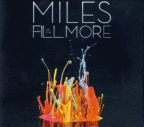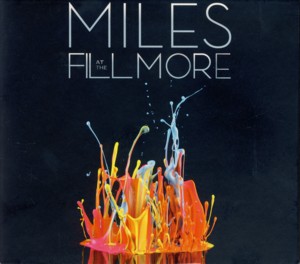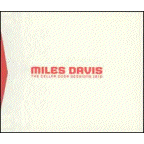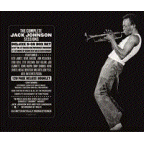Record Reviews
3 Reviews Found. Use search to find more reviews or follow the links in the review text.
  | MILES DAVIS ~ MILES AT THE FILLMORE 1970: THE BOOTLEG SERIES VOL.3
COLUMBIA 887654338129 (Barcode: 887654338129) ~ USA ~ Jazz
Recorded: 1970 Released: 2014
This is the 3rd installment of the "Bootleg Series" live recordings by American trumpeter / composer Miles DavisFind albums by this artist, released by ColumbiaFind albums on this label Records. The recordings in this set originate mainly from the performances at the Fillmore East by the Miles Davis septet during four consecutive nights between June 17 and June 20, 1970. Three additional tracks originate from an earlier Miles Davis sextet performance at Fillmore West on April 11, 1970, recorded just a few days after Columbia released "Bitches BrewFind albums with this title" (on March 30, 1970), which changed the face of music forever.
The sextet and septet were the post-"Bitches Brew" working groups, which featured saxophonist Steve GrossmanFind albums by this artist, keyboardist Chick CoreaFind albums by this artist and Keith JarrettFind albums by this artist (in the septet only, first double keyboards group by Miles), bassist Dave HollandFind albums by this artist, drummer Jack DeJohnetteFind albums by this artist and percussionist Airto MoreiraFind albums by this artist. Except for Grossman and Jarrett all the other musicians took part in the recording of "Bitches Brew".
The music is of course a direct follow up to the studio versions of these tunes and Davis makes no attempt to "ease up" or compromise the music and its intrinsic freedom and improvised nature, even though the Fillmore venues were at the time the Mecca and Medina of American Rock. Davis considered his music to be an integral part of the revolutionary wave of music created at the time, typically ignoring ridiculous genre divisions, and the audiences seem to share his attitude wholeheartedly.
Live recordings are always the best opportunity to check out the authenticity and integrity of musicians and these recordings are a great proof of the fact that the "Bitches Brew" magic really happened in the studio as a result of superb playing and visionary leadership, rather than post-production work by Teo MaceroFind albums by this artist. The overall level of the individual performances is of course incredibly high and inspired, full of intensity and virtuosic mastery.
Although the Fillmore West tracks suffer from some sound quality plight, this music is an absolute must to all Miles Davis fans. The four consecutive nights at Fillmore East present a similar set list, but the actual performances are so dramatically different that listening to them opens up a whole new way of comprehending the music of Miles Davis and understanding the concept of Jazz and its unique nature.
Four and a half decades later this music still kicks ass as only very few other sound sculptures are able to, and hopefully will continue to do so in the decades to come. Spearheading the Golden Decade, Miles Davis justifies his Godly status in full.
| | Updated: 31/12/2024Posted: | CD 4 Digipak Remastered Essential Recommend To A Friend |
  | MILES DAVIS ~ THE CELLAR DOOR SESSIONS 1970
COLUMBIA 93614 (Barcode: 827969361429) ~ USA ~ Jazz
Recorded: 1970 Released: 2005
It would be incredibly presumptuous to write any kind of serious musical review of this music in a limited format, so I’ll only stick to the very basics here. The music contained in this set was recorded live on December 16-19, 1970 in a dinky little Washington, DC club called “Cellar Door”. Why would Miles play in such a venue at all remained a mystery (one of many around Miles’ life and work), as he could easily sell out any concert hall in the US. In retrospect it now becomes obvious that Miles simply wanted a sort of limited exposure live recording opportunity to record his new band, which was yet another change of direction in his career. Following the groundbreaking Bitches BrewFind albums with this title and Jack JohnsonFind albums with this title sessions, Miles decided to strip down his ensemble to the bare minimum and concentrate on a more rock / funk oriented sound. Miles was always intensely attentive to everything that was happening around him musically and his frequent performances at the Fillmore venues exposed him to scores of rock bands, which enjoyed immense popularity with the crowds. Miles concluded that he could easily play music, which would be as acceptable to the rock crowds as the rock music they were accustomed to, hell he could do it better! This sessions prove that he was absolutely right. For the new group Miles kept Keith JarrettFind albums by this artist on electric piano, since Keith was already at ease with rock oriented material he played in his earlier stints. He also kept Jack DeJohnetteFind albums by this artist on drums, as John could rock better that any of the rock drummers around, considering his immense talent and technique. The saxophone spot was taken by Gary BartzFind albums by this artist (Steve GrossmanFind albums by this artist was having serious drug-related problems), a young and extremely capable player who sounded remarkably similar to John ColtraneFind albums by this artist, but felt comfortable with the funky rhythms. The biggest change (and surprise) was the bass spot, which Miles assigned to the tender MotownFind albums on this label (yes – the Jackson 5Find albums by this artist!) electric bassist Michael HendersonFind albums by this artist. Henderson’s pulsating funky rhythms set the essence for these sessions, not only serving as a rock solid foundation upon which the musicians are free to develop their improvisations, but also being the glue that keeps the music together. The quintet of Davis, Bartz, Jarrett, Henderson and DeJohnette play on all the 6 CDs in this set. The Brazilian percussionist Airto MoreiraFind albums by this artist joins the quintet on the 3rd day (expanding it to a sextet) and is heard on 4 CDs. Moreira’s contribution to Miles’ music deserve a chapter in itself - in these sessions he skillfully adds color and polyrhythmic accents, always with taste and precision. On the last day the group is extended to a septet with John McLaughlinFind albums by this artist joining in on his fire blazing electric guitar, like there is no tomorrow. This truly turns the whole ensemble into the “greatest fucking rock band you ever heard”, to quote Miles. McLaughlin is in his usual great form, which means he is just way ahead of anything else done at that time on guitar. What about Miles himself? Let me just say that he plays some of his best notes ever on these sessions, full of vigor, passion and inspiration. What else can I say here? This music is beyond comparison, beyond criticism, beyond all the bullshit people say about music… If you didn’t hear it you simply don’t exist - musically that is ;).
| | | CD 6 Box Set Oversampling Remastered Bonus Tracks Essential Recommend To A Friend |
  | MILES DAVIS ~ THE COMPLETE JACK JOHNSON SESSIONS
COLUMBIA 86359 ~ USA ~ Jazz
Recorded: 1970
This is the 7th chapter in the ColumbiaFind albums on this label’s epic series of Miles DavisFind albums by this artist Box Sets, which is a monumental reissue project of recordings by the most important Jazz musician of the 20th century. Recorded between February and June 1970 this monumental document defines “Electric Jazz” – anything recorded since, be it Jazz, Rock or Fusion, has its roots here. These almost five hours of music remained mostly unreleased till this set was issued, as the original A Tribute To Jack JohnsonFind albums with this title album contained less than 10 % of the music included herein. Although a few other “cooked” albums included snippets of this music (Live-EvilFind albums with this title, Get Up With ItFind albums with this title, DirectionsFind albums with this title and Big FunFind albums with this title) they were never available in their full form. By the time this material was recorded Miles’ approach to creating music changed dramatically: he was more of a captain giving the crew a general direction as to where he wanted to go, ratter that a navigator concerned with the exact details as to the course taken. An enormous amount of freedom was granted to the stellar collection of participants (Keith JarrettFind albums by this artist, Herbie HancockFind albums by this artist, Chick CoreaFind albums by this artist – keyboards, Steve GrossmanFind albums by this artist, Bennie MaupinFind albums by this artist, Wayne ShorterFind albums by this artist – saxes, Dave HollandFind albums by this artist, Ron CarterFind albums by this artist, Michael HendersonFind albums by this artist – bass, John McLaughlinFind albums by this artist, Sonny SharrockFind albums by this artist – guitar, Jack DeJohnetteFind albums by this artist, Gene PerlaFind albums by this artist – drums, Airto MoreiraFind albums by this artist, Hermeto PascoalFind albums by this artist – percussion) and for the first time Miles promoted John McLaughlin to be the primary soloist, much more dominant than his trumpet. McLaughlin of course was up to the job and presents some incredible guitar playing, firmly establishing the electric guitar as the leading instrument in instrumental music for the years to come. His fearless ventures into the uncharted territory of Fusion and even Rock would become a beacon for generations of guitar players, a source of inspiration and a vital learning tool. The unrestrained, almost jam-like atmosphere of the sessions inspired all the participants to search for the best they could achieve and the resulting music is simply phenomenal. This is visionary and groundbreaking, Promethean and pioneering musical creation, an absolute must to any Jazz fan that takes his music seriously..
A special note to collectors:
The initial release of all the Miles Davis Box Sets in this reissue series is packaged in an exquisite metal-bound (except chapter 5 which is cardboard-bound) frame housed in a hard cardboard CD-sized slipcase (except for chapters 1 & 8 which have a metal slipcase). Once the initial release is sold out, the CDs are repackaged in a tall-box digipack book format. Naturally the tall-box issues have a much lower retail price tag. All the initial release CD-sized issues become priceless collectors’ items in time.
| | Updated: 26/01/2019Posted: | CD 5 Box Set Oversampling Remastered Bonus Tracks Essential Recommend To A Friend |
|







